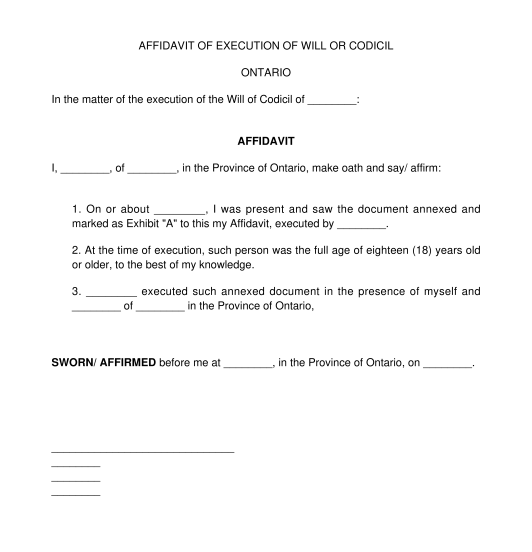 15/09/2025
15/09/2025

Answer a few questions and your document is created automatically.

Your document is ready! You will receive it in Word and PDF formats. You will be able to modify it.

 15/09/2025
15/09/2025
 Word and PDF
Word and PDF
 1 page
1 page
An Affidavit of Execution allows someone to swear they witnessed the signature of a legal document. They swear either under oath or affirmation:
These both have an identical legal effect, the breach of which is the criminal offence of perjury.
The Affidavit of Execution of Will or Codicil is needed when someone executes (signs) a Will or Codicil, and that Will or Codicil is witnessed. Witnessing means seeing the person sign their Will or Codicil, and the witness then signs the Will or Codicil themselves. If the witness signed the Will or Codicil, they would sign this Affidavit.
This document is for an affidavit of execution of a will or codicil. Other affidavits may be used depending on the legal context. For example:
No. While having an affidavit is usually not legally required, it is a document that helps prove that the power of attorney was property executed. This means that it proves that the person who signed the affidavit did so in compliance with the law and the appropriate witnesses observed the signature. Furthermore, the rules of civil procedure may require an affidavit before accepting a will for probate purposes.
An affidavit of execution of will or codicil must contain several statements:
Before signing an affidavit of execution of will of codicil, the actual will or codicil itself must have been signed by the grantor (the maker) of the will or the codicil. An affidavit of execution of will or codicil has no relevance if the actual will or codicil document hasn't been signed.
An affidavit of execution of will or codicil must be signed by one of the witnesses to the actual will or codicil. In short, the process is the following:
After witnessing a person sign their Will or Codicil, the Affidavit of Execution is then signed by the person who witnessed the signature on the Will or Codicil. Witnessing means the witness was physically present and saw the person sign the legal document in front of them.
Once the witness signs the Affidavit, a commissioner for oaths and affidavits must also sign (commission) the document to verify the authenticity of the statement. Notaries are also authorized to commission these documents.
The Affidavit must be signed in front of a Commissioner or Notary. If the Commissioner or Notary isn't present, print out the document and wait to sign it in the presence of the Commissioner or Notary. Some Provinces and Territories permit remote signing.
The affidavit of execution of will or codicil should be attached to the will or codicil itself. The affidavit of execution proves that the will or codicil was properly signed, therefore it's important to attach the two documents together.
Yes. Having a witness, specifically a commissioner, is necessary for an affidavit of execution.
Witnessing means seeing the person sign their Will or Codicil, and the witness then signs the Will or Codicil themselves. If the witness signed the Will or Codicil, they would sign this Affidavit. Once the Affidavit is signed, a Commissioner or Notary signs the Affidavit. These are people authorized by law to witness Affidavits, which is a requirement. A simple Internet search can be used to locate a local commissioner or notary.
The affidavit of execution needs to be commissioned by a commissioner, which will be an added fee. The amount of the fee depends on the individual commissioner's rate (around $50-$300).
Affidavits are used depending on the legal context. For example, when dealing with a lawsuit, the law requires the filing of Affidavits with the court. When dealing with a deceased's estate, the law requires the filing of an Affidavit of Execution to probate (prove) the Will of the deceased. An Affidavit is also used when changing a marital name or transferring title to property.
The affiant in an Affidavit must be honest when recounting the facts. Lying under oath or affirmation is a federal crime under the Criminal Code (R.S.C., 1985, c. C-46).
You fill out a form. The document is created before your eyes as you respond to the questions.
At the end, you receive it in Word and PDF formats. You can modify it and reuse it.
Affidavit of Execution of Will or Codicil - Template
Country: Canada (English)